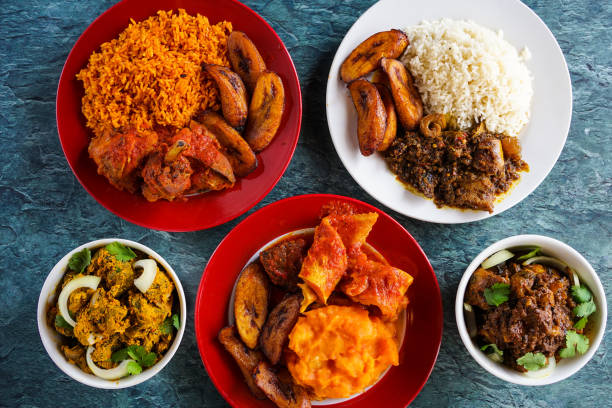Celebrating the Vibrant Flavors of Nigerian Cuisine
Nigerian cuisine, with its bold flavors and colorful presentations, is a feast for the senses. This article takes you on a culinary journey across Nigeria, introducing you to its unique dishes, cooking techniques, and the innovation transforming its food scene.

The Rich Tapestry of Nigerian Food
Nigeria, the most populous African country, boasts a diverse culinary scene influenced by its ethnic groups and history. From the spicy soups of the Igbo to the meaty stews of the Hausa and Yoruba, each dish reflects a unique cultural narrative. Nigerian cuisine is underpinned by staple foods like yams, cassava, plantains, and rice, which are transformed into an array of dishes using an assortment of spices and cooking techniques.
The Staples: Yam, Rice, and Beyond
Nigeria’s food landscape is dominated by starchy staples, with yam and rice being the most prevalent. They are often served with richly flavored soups, such as Egusi soup made with melon seeds, or stewed meats. Moreover, plantains, cassava, and maize also play a crucial role, often ground into flour to create dishes like “fufu” or “akpu”.
A Symphony of Flavors: Nigerian Spices
Nigerian cuisine is renowned for its bold flavors, achieved through the use of a variety of indigenous spices and herbs. These include ‘Uziza’ (West African pepper), ‘Ehuru’ (African nutmeg), and ‘Uda’ (Negro pepper). The fiery ‘Scotch bonnet’ pepper also adds a signature heat to many Nigerian dishes.
The Art of Nigerian Street Food
Street food in Nigeria is a vibrant and essential part of the culinary culture. From the smoky allure of ‘Suya’, skewered meat sprinkled with a peanut-spice rub, to the sweet satisfaction of ‘Puff Puff’, a deep-fried dough snack, Nigerian street food offers a delightful taste of the nation’s diverse flavors.
Innovation in Nigerian Cuisine
Today’s Nigerian chefs are innovating traditional recipes, marrying them with global influences. From using locally sourced ingredients in unexpected ways to presenting traditional dishes with a modern twist, Nigerian cuisine is constantly evolving, yet maintaining its distinctive character.
Discovering Nigerian Cuisine: Tips & Facts
- Nigerian cuisine is typically spicy. If you’re not used to heat, start with milder dishes like Jollof Rice.
- ‘Eba’ and ‘Amala’ are popular Nigerian ‘swallow’ foods, often served with soups or stews.
- ‘Akara’, deep-fried bean cakes, are a must-try street food.
- ‘Nkwobi’, a spicy cow foot dish, is a popular delicacy often enjoyed with palm wine.
- Many Nigerian dishes are gluten-free and vegan-friendly, like the ‘Moi Moi’, a steamed bean pudding.
In conclusion, Nigerian cuisine is a rich blend of tradition, diversity, and innovation. Its vibrant flavors, hearty staples, and diverse spices offer a unique culinary experience. Whether you’re sampling street food, indulging in a traditional feast, or exploring modern interpretations, Nigerian cuisine is bound to captivate your palate. So, why not embark on your own Nigerian food adventure and discover this vibrant cuisine for yourself?




